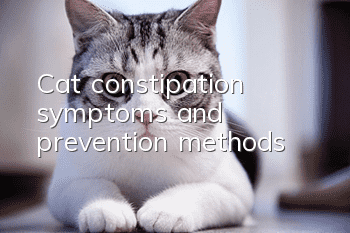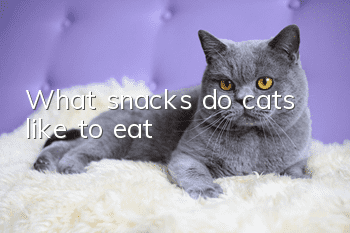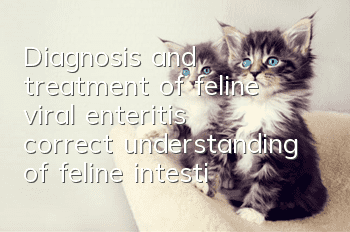Cat constipation symptoms and prevention methods

Raising a cat is a meticulous job that requires attention to many aspects. Some seemingly small things, if not noticed, can have a great impact on the cat. For example, cats cannot be kept in a state of constant lack of water. In fact, they cannot be kept in a small space all the time. These situations can easily cause constipation in cats. Pet owners should pay more attention to their daily diet during the feeding process.
1. Causes of constipation in cats
1. The diet is too dry
Factors such as long-term feeding of dry food, lack of drinking water, eating human hair and foreign objects, lack of exercise, and sudden changes in feed, environment, and management may all induce this disease.
2. Caused by gastrointestinal diseases
Cats may feel pain when defecating. They may be ill, such as rectal polyps, proctitis, rectal stenosis, tumors, anal abscesses, etc. Constipation occurs due to the disappearance of the normal urge to defecate.
A cat’s diet is too dry and lacks water, which can easily cause constipation.
3. Caused by movement disorders
Diseases that impede defecation movements, such as medullary joint dislocation, pelvic fractures, and hind limb fractures, are all possible causes of constipation in cats.
2. Symptoms of constipation in cats
1. Initial forced defecation
Initial symptoms of constipation can be observed. The sick cat defecates very hard and excretes a small amount of dry stool with mucus, or a small amount of foul-smelling loose stool, indicating a tendency to become ill.
2. Feeling uneasy in the later stages of illness
In the later stages of illness, sick cats will show uneasiness, become nervous easily, scream, get angry and want to scratch people, try to defecate but cannot easily defecate, frequently look back at the abdomen, and lick the abdomen.
3. Severe constipation and bloating
Causes loss of appetite, or not eating anything, and the spirit is not as lively and depressed as before. There was vomiting, obvious tenesmus, abdominal distension, and intestinal distention.
3. Treatment methods for cat constipation
1. Mild enema therapy
Suitable for mild and simple constipation. Use 40-80 ml of warm soapy water, pour it into the intestine with an enema, and use external abdominal pressure to moderately press the fecal mass in the intestine. Generally works.
2. Use drug treatment
When a cat is sick, an appropriate amount of oral laxatives can be given. For example, 5-30 grams of magnesium sulfate or 5-50 ml of liquid paraffin oil should be used under the instructions of a doctor to avoid harming the health of the cat.
3. Severe surgical treatment
If you have tried many methods but to no avail, you may need to take your cat to the doctor for severe constipation or the inability to pass stool normally. If the above methods do not work, you can perform surgery to remove the fecal matter from the intestinal cavity.
4. Methods to prevent cat constipation
1. Pay attention to daily feeding
When feeding, you should pay attention to the mix of cat food. Especially for elderly cats, you should increase food containing more fiber and do not let cats eat food that is not easy to digest.
Don’t let pets feel thirsty or lack of water, and ensure adequate daily water supply.
3. Strengthen exercise examination
Strengthen the cat's exercise, and don't let them eat until they are full, sleep, or wake up to eat. Check your cat's anal glands regularly. Life details to prevent constipation in cats.
4. Give enough fiber
Cats need a certain amount of fiber for digestion. Pet owners should pay attention to increasing these things in their daily lives. For example, you can add cat grass to the cat or directly buy laxative hair cream for the cat to use. Of course, you can also use prescription food directly.
- Analysis of the reasons why cats suddenly scratch people, and how to pet cats correctly?
- What causes cats to lose hair?
- Why does a kitten have blood in its stool?
- Can Chinchilla and Ragdoll cats be bred? Cat breeds!
- Can the hair on Persian cats’ ears be trimmed?
- What should cats eat to supplement calcium?
- Can a two-month-old cat be dewormed?
- What's the matter with a pimple on a cat's head?
- Here are some of the major cat-raising worries that cat owners have, here are some cat-raising strategies
- What kind of cat food is better for Ragdoll cats?



